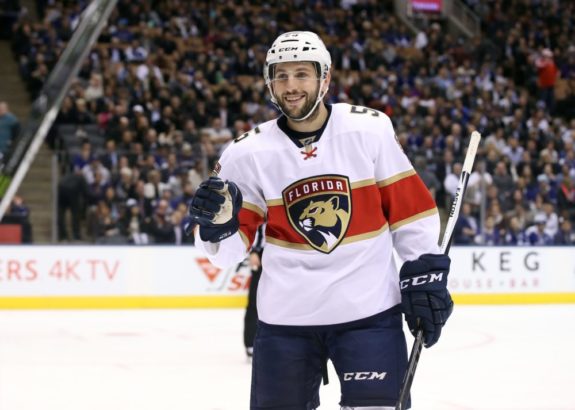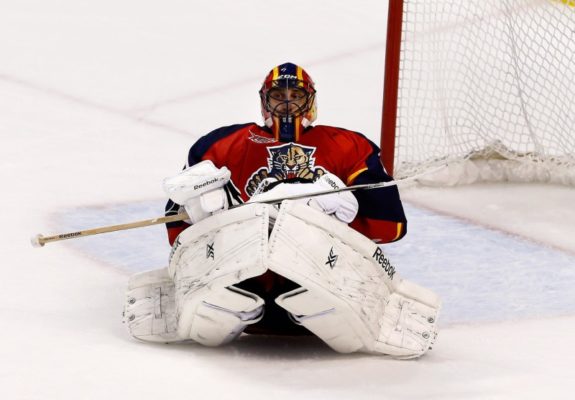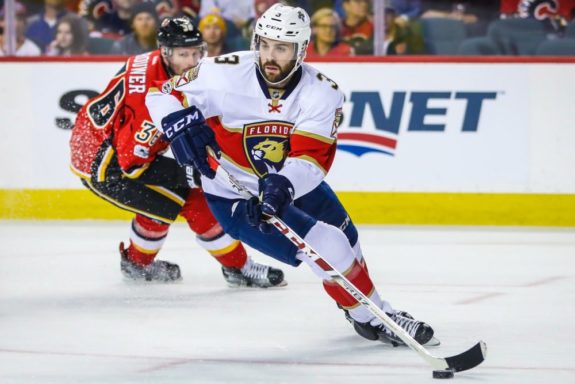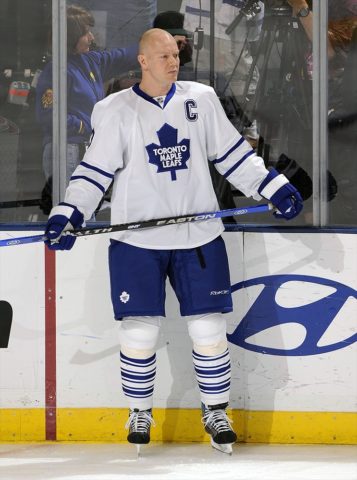No-trade clauses are a powerful negotiating tool for general managers and players alike. For GMs, NTCs can be used to entice a player to lower his asking price in exchange for some semblance of security. And as for players, who have very little control over their lives once drafted, NTCs give them at least some say in their future.
Greg Wyshynski published an article dissecting NTCs, labelling them “a necessary evil,” albeit one whose utilisation GMs would be wise to restrict. In his piece, he references some work from Colin Cudmore, who compiled a handy chart of all the NTCs in the National Hockey League.
https://twitter.com/CudmoreColin/status/889915342872600576
The Florida Panthers, like all National Hockey League teams, make use of these clauses, so it’s worth taking a look at how these contract stipulations are shaping up for the Cats.
What Is a No-Trade Clause?
But first, the basics: a no-trade clause, or NTC, prevents a team from trading a player, unless the player agrees to such a move. Oftentimes, an NTC will be limited, or “modified,” in scope. For example, Jussi Jokinen, bought out by the Panthers this summer, would have had an NTC with a 12-team trade list this upcoming season. As in, the Panthers could only trade him to one of the 12 teams he specified, unless they were to be able to persuade him otherwise. Likewise, many players have modified NTCs with a no-trade list.
No-Movement Clause
Even more restrictive, a no-movement clause, or NMC, prevents a team from trading a player, and from placing them on waivers and or assigning them to the minors (to remove an unpalatable contract from the NHL team’s cap, for example).
Florida Panthers NTCs and NMCs
Please note the below information only concerns clauses currently in effect.
Evgeny Dadonov: Full No-Movement Clause With Modified No-Trade Clause
A third-round pick of the Panthers in 2007, Dadonov signed in South Florida earlier this summer after five years away from the North American game. Though the last three of these seasons were especially impressive, it should be noted they were spent with Kontinental Hockey League powerhouse SKA Saint Petersburg. That said, Dadonov led his former KHL team, HC Donbass, in scoring in 2012-13, and was second the following year.
His three-year, $12 million contract is not especially worrying, given the explosive potential of the player and the need for scoring in the Panthers’ depleted forward corps. The Panthers have shed much salary this summer, so they also have the cap space to take such a chance. What is worrying is that Florida, in agreeing to a full NMC for each year of the contract, has not really given themselves an out.
Yes, in 2019-20, the final year of his deal, Dadonov has to submit a 10-team trade list. We’ll probably be enduring another lockout that season, so who knows if that’ll even be necessary. Regardless, despite flashes of brilliance, Dadonov did not succeed in his first foray in North America. What if he struggles again? Though this contract will never be an albatross, the budget-conscious Panthers would certainly feel the burn of $4 million dollars going to waste.
Like much of what the Panthers have done this summer, there is every chance the Dadonov contract works out spectacularly well. Judging by his numbers in Russia, both before and after his stint in North America, it is entirely possible Dadonov is simply a late bloomer. Maybe he’ll come in and pot 20-plus goals and 50-plus points, boosting the scoring of an offensively challenged team. If Dadonov can give the Panthers what Alexander Radulov gave the Montreal Canadiens last season, you’ll not hear a peep from anyone.
It’s just that the notion of giving a full (almost), three-season NMC to an unproven NHL commodity is enough to make even the most seasoned hockey fan just a little bit clenched.
Jason Demers: Modified No-Trade Clause
Jason Demers has four years remaining on his contract with the Panthers that pays him an average of $4.5 million per season. Not an unreasonable contract for a right-handed shot who fits in nicely as a number three defenseman and who plays a good, solid, all-around game. Nothing spectacular, just a good defenseman with good numbers on a reasonable contract. So, of course, this being the Florida Panthers, they’re trying to trade him.

As for Demers’ modified NTC, an eight-team no-trade list gives the Panthers 22 other places to deal him. As mentioned, Demers shoots right, a coveted asset amongst defenseman. Add to this very good shot suppression numbers (according to Own The Puck) and an ability to play anywhere you need him to, and the Panthers should have no trouble offloading the veteran rearguard (though he has already blocked one trade). Although why they’d want to is beyond me; if Demers can do for the Panthers what Niklas Hjalmarsson did for the Chicago Blackhawks (provide a steady, stabilising presence on the back end), they should endeavour to keep him.
Roberto Luongo: Modified No-Trade Clause
In fairness, it was not the Panthers who signed Luongo to his mammoth, cap-circumventing 12-year, $64 million contract with a (slightly) modified NTC. In case you don’t remember, Luongo requested a trade (thereby agreeing to waive his NTC) from the Vancouver Canucks following the 2012 season, a request eventually granted at the 2014 trade deadline.
Regardless, you can’t get away from the fact Luongo has five years remaining on his deal, meaning he’ll be 43 when it expires. At an annual cap hit of $4.533 million (the Canucks retained the other 15 percent, or $800,000), it might make sense to move Luongo if Florida requires cap room (or wants to dump more salary). And it would have to be after this year, as the team can request a 5-team trade list following the 2017-18 season.

On the other hand, it might make even more sense to keep Luongo around. Already possessing Hall of Fame credentials, Luongo is still an effective NHL goaltender, and should still be able to spell batterymate James Reimer on a regular basis for the foreseeable future. Keeping Luongo around, especially considering Reimer’s injury history, is not a bad insurance policy. It also helps the marketing-challenged Panthers, in that Luongo is a delightful, media-savvy personality that loves living in the area.
Plus, as of 2018-19, his contract pays him half (in real money) of what it does this coming season, before being halved again the year after. Then, for the final two years of his deal, Luongo is only owed $1 million per season in actual salary. Well into his 40s by this point, Luongo might just choose to retire. Even if he keeps playing, the actual money Florida will have to give him will be negligible.
Keith Yandle: Full No-Movement Clause With Modified No-Trade Clause
Perhaps the most troubling clause on the Panthers’ books is the full No-Movement Clause of Keith Yandle. Yandle is a gifted offensive defenseman, to be sure. However, his defensive game is suspect, with below-average shot suppression (one of the stats tracked by Own The Puck) and, according to Puckalytics, the lowest percentage of defensive zone starts amongst all Panthers blue-liners in 2016-17.
That said, like many high-risk, high-reward players, Yandle has the ability to make up for his mistakes, possessing sublime skating and excellent offensive instincts. But is he really worth the $6.35 million-dollar cap hit until 2022-23? Especially when said contract comes with a full NMC, save for its final season when Yandle submits a 12-team no-trade list?

I get that Yandle was one of the most coveted unrestricted free agents on the market last summer. But the Panthers traded for his negotiating rights well ahead of July 1. Thus, seeing as Florida proceeded to sign him just three days later and Yandle therefore never made it to free agency, no other teams, theoretically anyways, would have been able to pitch him offers.
The Panthers were also dealing from a position of relative strength: despite a disappointing first-round loss in the playoffs, the Panthers showed well in that series and appeared to be a team on the rise after winning the Atlantic Division. Florida also has no state income tax, meaning players keep much more of what they earn compared to other destinations. Not to mention the beautiful weather.
So why throw a bloated offer at a specialist defenseman? Especially considering Florida’s favourable tax situation could have been used to drive down the price? And why would the Cats then tack a (nearly) full NMC onto that contract?
The Panthers have a razor-thin margin of error on this deal. If other defensemen surpass him on the depth chart and he is played in favourable situations, things could turn out great. Yandle is a tonne of fun to watch and provides the Cats with much-needed offense. But if the team still views him as their number two defenseman? Yikes.
Don’t Hate the Players, Hate the Game

It’s only natural to feel animosity towards players with no-trade or no-movement clauses. These clauses, if given out carelessly, can set teams back years. Even if a given player is performing up to expectations, an NTC or NMC, if enforced, can become a rallying point for disgruntled fans. Remember how quickly Toronto Maple Leafs fans turned on Mats Sundin when he elected not to waive his NTC in 2008?
These contract clauses are not without sacrifice. Players often take less money in exchange for an NTC, trading earnings for security. Such contracts are often signed at an age when players want to settle down, buy a house, start a family and build a life so they have something to come home to when their career is done.
Not that we should feel too badly for people making millions of dollars for playing a game. But these clauses are negotiated in good faith, and should be honoured as such.
Perhaps the most difficult job is that of a GM: give out a NTC and you’ll probably get your man for less money, but you also risk your team’s future (and likely your job) down the road. Refuse to give out an NTC and you might pay more than you want, risking your team’s future (and likely your job) down the road. Or the player might bolt for a team that will give him what he wants, which risks your team’s future (and likely your job) down the road.
It’s a tricky balance, to be sure. The Florida Panthers had better hope they got it right.
(All contract information is courtesy CapFriendly.)